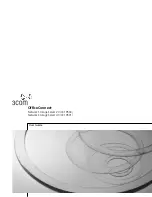
32
It is a good practice to calculate performance against the host port bandwidth when
designing an application topology. As an example, if eight members are included in a logical
drive and this logical drive is associated with a host ID (LUN mapping), the combined
performance of this logical drive should approximate the channel bandwidth. If, for example,
two 6-drive logical arrays are associated with two IDs residing on a single host channel,
there may be a trade-off with performance.
If your system comes with a total of 8+ host ports, it is recommended that you obtain more
disk drives by attaching an expansion enclosure so that you can create host-port
corresponding 6-member logical drives (RAID-5) or 8-member logical drives (RAID-6).
These logical drives leverage the bandwidth of each host port.
There are other considerations:
-
For example, a spare drive carries no data stripes and will not contribute to disk-level
performance. Refer to the documentation for your hard drives for performance data.
-
The disk drives in the same logical array should have the same capacity, but it is preferred that
all the drives within a chassis have the same capacity.
-
Disk drives in the same logical drive should have the same capacity, but it is preferred that
all the disk drives within a chassis have the same capacity. Tiered storage configuration
is supported. However, you should not include both SAS and SATA drives in a logical drive.
-
A spare drive should have a minimum capacity that is equivalent to the largest drive that it is
expected to replace. If the capacity of the spare is less than the capacity of the drive it is
expected to replace, the controller will not proceed with the failed drive rebuild.
-
When cabling, follow all the specifications. Pay attention to signal quality and avoid electronic
noise from adjacent interfaces, e.g., do not lay power cords on optical cables.
-
When rack-mounted, leave enough slack in the cables so that they do not bend to a
diameter of less than 76mm (3 inches).
-
Route the cables away from places where it can be damaged by other devices, e.g., foot traffic
or fan exhaust.
-
Do not over-tighten or bend the cables.
Host-Side Topologies
The primary concern for configuring host-side topologies is to avoid points of failure. It is
therefore recommended that the host ports are connected to at least two HBAs.
NOTE
In order to manage the fault-tolerant data paths and to optimize data throughput on
multiple data paths, it is necessary to apply MPIO multipath software or utilities such
as Linux Device Mapper.
Host port channel designation may vary from system to system, please refer to the
following topologies as a guide to create your own connections to suit your needs.
Host-Side Parameters
It is STRONGLY recommended that users use the default settings with their system. Should
you feel the need to adjust your host-side parameters, please consult on-site technical
personnel or seek technical support from your vendor.
















































